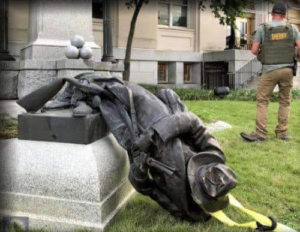 The destruction of Confederate monuments and the slandering of all things Confederate is in vogue in contemporary mainline media, academia, and the political establishment. The destruction of Confederate monuments by radical mobs is similar to the radical Taliban’s destruction of Buddhist monuments and the Soviet Union’s denial of public expressions of native culture in the Baltic states—all are examples of cultural genocide.[1] Standard American history as written by the victors in the so-called “Civil War” supports and encourages Southern cultural genocide. As noted by Southern historian Grady McWhiney, “What passes as standard American history is really Yankee history written by New Englanders or their puppets to glorify Yankee heroes and ideals.” Continue reading
The destruction of Confederate monuments and the slandering of all things Confederate is in vogue in contemporary mainline media, academia, and the political establishment. The destruction of Confederate monuments by radical mobs is similar to the radical Taliban’s destruction of Buddhist monuments and the Soviet Union’s denial of public expressions of native culture in the Baltic states—all are examples of cultural genocide.[1] Standard American history as written by the victors in the so-called “Civil War” supports and encourages Southern cultural genocide. As noted by Southern historian Grady McWhiney, “What passes as standard American history is really Yankee history written by New Englanders or their puppets to glorify Yankee heroes and ideals.” Continue reading
Category Archives: Mr. Adair’s Classroom
Lincoln the Dwarf: Lyon Gardiner Tyler’s War on the Mythical Lincoln
 In 1917 Lyon Gardiner Tyler picked up a copy of the New York Times and grew angry. What so incensed Tyler was an editorial suggesting that Southern slaveowners were akin to the Hohenzollern autocrats then plaguing the world. The editorial insisted that slaveowners were arbitrary and oppressive and that they had sought to extend slavery. When the North and the Republican Party resisted, the South declared war, characterizing it as defensive, just as the Hohenzollerns described their aggression as defensive in nature. Continue reading
In 1917 Lyon Gardiner Tyler picked up a copy of the New York Times and grew angry. What so incensed Tyler was an editorial suggesting that Southern slaveowners were akin to the Hohenzollern autocrats then plaguing the world. The editorial insisted that slaveowners were arbitrary and oppressive and that they had sought to extend slavery. When the North and the Republican Party resisted, the South declared war, characterizing it as defensive, just as the Hohenzollerns described their aggression as defensive in nature. Continue reading
Jefferson Davis ~ Farewell to the Senate (January 2, 1861)
“If you will have it thus, we will invoke the God of our fathers.“
 WASHINGTON, D. C., January 2, 1861 – Jefferson Davis, already a veteran of war and politics at the age of 52, and obviously wracked by the pains of illness, stood at his desk in the Senate today to deliver a calm speech that in other countries might have seen him dragged immediately to a dungeon.
WASHINGTON, D. C., January 2, 1861 – Jefferson Davis, already a veteran of war and politics at the age of 52, and obviously wracked by the pains of illness, stood at his desk in the Senate today to deliver a calm speech that in other countries might have seen him dragged immediately to a dungeon.
It is the strange temper of these times, however, that it was possible for a courtly Southerner to announce calmly that his State had seceded from the Union, by his own advice and with his consent, and that accordingly he no longer would appear as its spokesman there.
“I do think that she has a justifiable cause,” he said, “and I approve of her act.” Continue reading
Lincoln and the Bankers ~ April 12, 1861
The bankers go to work to start the Civil War.
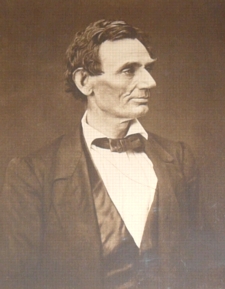 With the Central Bank killed off, fractional reserve banking moved like a virus through numerous state chartered banks instead causing the instability this form of economics thrives on. When people lose their homes someone else wins them for a fraction of their worth. Depression is good news to the lender; but war causes even more debt and dependency than anything else, so if the money-changers couldn’t have their Central Bank with a license to print money, a war it would have to be. We can see from this quote of the then chancellor of Germany that slavery was not the only cause for the American Civil War. “The division of the United States into federations of equal force was decided long before the Civil War by the high financial powers of Europe. These bankers were afraid that the United States if they remained as one block would attain economic and financial independence which would upset their financial domination over the world.” ~ Otto von Bismark, the Chancellor of Germany, who united the German states.
With the Central Bank killed off, fractional reserve banking moved like a virus through numerous state chartered banks instead causing the instability this form of economics thrives on. When people lose their homes someone else wins them for a fraction of their worth. Depression is good news to the lender; but war causes even more debt and dependency than anything else, so if the money-changers couldn’t have their Central Bank with a license to print money, a war it would have to be. We can see from this quote of the then chancellor of Germany that slavery was not the only cause for the American Civil War. “The division of the United States into federations of equal force was decided long before the Civil War by the high financial powers of Europe. These bankers were afraid that the United States if they remained as one block would attain economic and financial independence which would upset their financial domination over the world.” ~ Otto von Bismark, the Chancellor of Germany, who united the German states.
On the 12th of April 1861 this economic war began. Continue reading
Benson: Socialism And The 14th Amendment
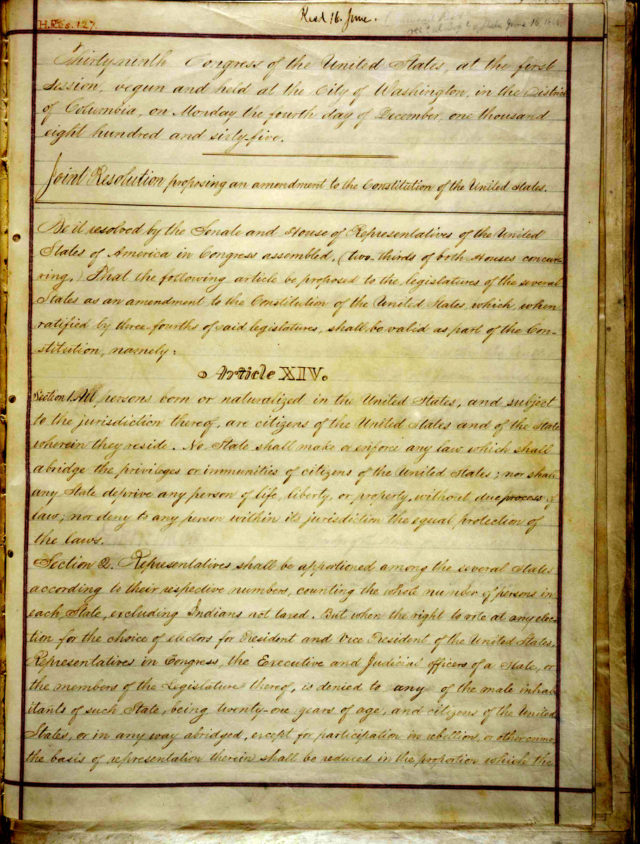
The 14th Amendment
Moral decline is one of the main fruits of apostasy. It is always accompanied by a decline in the level of personal responsibility. However, because responsibility is neglected does not mean that it has been eliminated. If rejected, it will be transferred elsewhere. If a formerly responsible people decide, one way or another, to abdicate their responsibilities and adopt a “Let Eroge (the State) do it” then you can rest assured that “George” will do it, and those that abdicated their responsibilities will live to regret what George does. Read First Samuel, chapter 8, in the Old Testament Scriptures.
After the shooting phase of the War of Northern Aggression had ceased and federal power grew, the States lost power. Now, in these latter years of insanity we live in, state governors, in order to maintain their popularity with a jaded electorate that wants everything done for them, have jumped on the “federal funds” bandwagon! Continue reading
Spivey: To my Brothers and Sons of Confederate Veterans
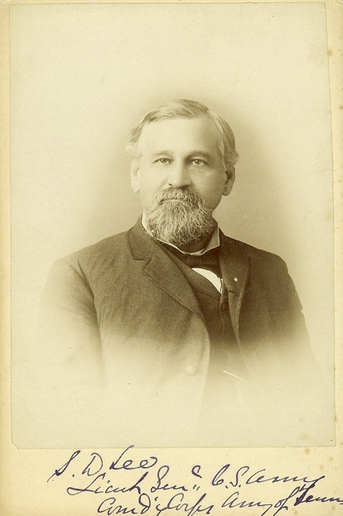 “To you, Sons of Confederate Veterans, we submit the vindication of the cause for which we fought. To your strength will be given the defense of the Confederate soldier’s good name, the guardianship of his history, the emulation of his virtues, the perpetuation of those principles which he loved and which made him glorious, and which you also cherish. Remember it is your duty to see that the true history of the South is presented to future generations.” ~ Lieutenant General Stephen Dill Lee, Commander-in-Chief, United Confederate Veterans, 24 April 1906.
“To you, Sons of Confederate Veterans, we submit the vindication of the cause for which we fought. To your strength will be given the defense of the Confederate soldier’s good name, the guardianship of his history, the emulation of his virtues, the perpetuation of those principles which he loved and which made him glorious, and which you also cherish. Remember it is your duty to see that the true history of the South is presented to future generations.” ~ Lieutenant General Stephen Dill Lee, Commander-in-Chief, United Confederate Veterans, 24 April 1906.
I joined the Sons of Confederate Veterans for three reasons. The first was to honor my ancestors who served under the greatest of men, General Robert E. Lee, in the Army of Northern Virginia. The second was to honor and protect the memories of, and monuments to, every Southern soldier, sailor, and marine that served the Confederate States of America in her struggle against the tyranny of a power-hungry Federal government. The third was to help perpetuate the truth about what led the Southern States to secede from the Union and what really caused Americans to slaughter each other by the tens of thousands in the War of Northern Aggression. I remain, and shall remain, a proud member of the SCV. That being said, I feel that the Sons, as a whole and generally speaking, are guilty of not fulfilling the charge given us by Lieutenant General S. D. Lee one hundred and twelve years ago. Continue reading
Secession: If at first you don’t Secede… ~ Part I
~ Foreword ~
This has been a long journey – and one that is long overdue, but I guess that in the scheme of things ~ ALL things for a reason.
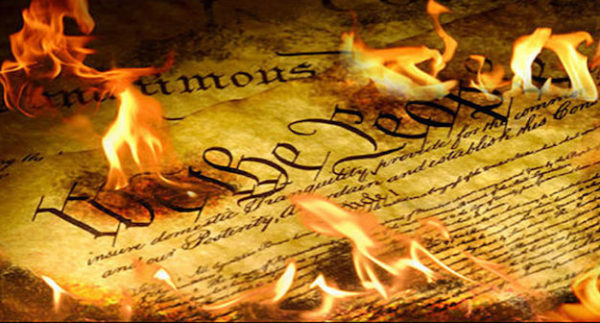
That “goddamnedpieceofpaper”-again
By the turn of the Millennium, I had already been broadcasting for a half-decade and due to the massive sized audience which I had developed by then – predominantly through short-wave and satellite broadcasts ~ I had made many friends. One such gentleman was located in the north-central region of Wisconsin ~ not an area known for its relations with true knowledge of the Confederate States of America ~ a region, philosophy and history which I became more than familiar with in my youth.
Hal Young was a good friend and loyal listener to my programming and had been for some years. I have recently located (by accident) a series of voluminous discs covering a wide expanse of American history which he had compiled and sent to me ~ probably around the years 2002-2003 ~ maybe a year or so later. Where have they been all of these years? Given that my office archives have grown to a massive collection – they got buried in boxes and subsequently in drawers and file cabinets ~ some of which have not been opened for years ~ but the time had come to begin pairing my life back from unnecessary “things” ~ and I came across Hal’s five discs ~ an oh, what a treasure they are.
 What we present to you this day, may seem to have been put together in a somewhat haphazard fashion ~ but the more I read it ~ the more it begins to make sense ~ however ~ it IS long, and hence ~ I will be posting it in several different “Chapters,” as all seems to have been put together with information coming from a range of resources.
What we present to you this day, may seem to have been put together in a somewhat haphazard fashion ~ but the more I read it ~ the more it begins to make sense ~ however ~ it IS long, and hence ~ I will be posting it in several different “Chapters,” as all seems to have been put together with information coming from a range of resources.
As with most postings of our columns are open to discussion – and correction by knowledgeable and qualified readers and contributors, so please feel free to participate. In our next Chapter, we will be going traveling back to to an earlier part of America’s history to study what the Founders had to say about this thing called, ‘secession.’
At the end of this lengthy post, you will find a link to a well related commentary, which expands the lessons contained below. we invite you to read, The Issue WAS State’s Rights
I’ll see you at Sundown…
Jeffrey Bennett, Editor and Publisher
They Cannot Win
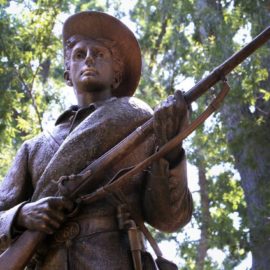 I’ve been decompressing since the Silent Sam Prayer Service on Sunday (16 December 2018) and trying to think about how to write about what went on that day. What was supposed to be a prayer service for not only the two hundred and eighty-seven boy soldiers from the university that is now the University of North Carolina at Chapel Hill that are represented by Sam, but for all the boy soldiers that served in the War (that’s right, Southern and Northern alike), was turned into something different because of the profanities and vulgarities that were screamed at us through loudspeakers and megaphones. We did manage our Invocation, and we tried to keep our cool and ignore them, laugh at them, even, but we did have a few slip-ups. Hey, we’re all human, right? Continue reading
I’ve been decompressing since the Silent Sam Prayer Service on Sunday (16 December 2018) and trying to think about how to write about what went on that day. What was supposed to be a prayer service for not only the two hundred and eighty-seven boy soldiers from the university that is now the University of North Carolina at Chapel Hill that are represented by Sam, but for all the boy soldiers that served in the War (that’s right, Southern and Northern alike), was turned into something different because of the profanities and vulgarities that were screamed at us through loudspeakers and megaphones. We did manage our Invocation, and we tried to keep our cool and ignore them, laugh at them, even, but we did have a few slip-ups. Hey, we’re all human, right? Continue reading
Thomas Paine’s American Crisis and Finding Hope in the Depths of Winter (December 19, 1776)
Thomas Paine’s Revolutionary War pamphlet may have changed the course of American history.
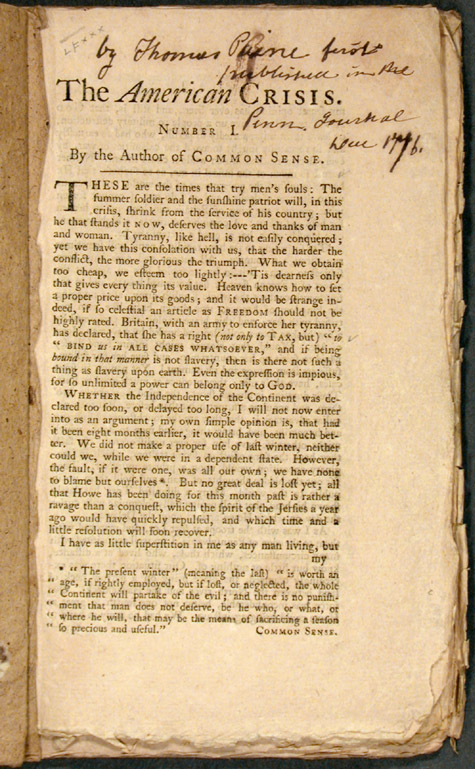 On December 19th, 1776, the firebrand journalist and activist Thomas Paine (1737-1809) published the first volume of his political pamphlet The Crisis (also known as The American Crisis). The Crisis would feature five more volumes over the next twelve months, documenting much of the first full year of the incipient American Revolution against England. Paine would go on to release thirteen additional volumes between 1778 and the Revolution’s 1783 conclusion, continuing to trace the conflict’s evolution and to add his passionate support to the colonist cause at each stage.
On December 19th, 1776, the firebrand journalist and activist Thomas Paine (1737-1809) published the first volume of his political pamphlet The Crisis (also known as The American Crisis). The Crisis would feature five more volumes over the next twelve months, documenting much of the first full year of the incipient American Revolution against England. Paine would go on to release thirteen additional volumes between 1778 and the Revolution’s 1783 conclusion, continuing to trace the conflict’s evolution and to add his passionate support to the colonist cause at each stage.
That December 19th number begins with some of the most eloquent and inspiring lines in American history:
These are the times that try men’s souls. The summer soldier and the sunshine patriot will, in this crisis, shrink from the service of his country; but he that stands it NOW, deserves the love and thanks of man and woman. Tyranny, like hell, is not easily conquered; yet we have this consolation with us, that the harder the conflict, the more glorious the triumph. What we obtain too cheap, we esteem too lightly: ‘Tis dearness only that gives everything its value. Continue reading
Edmund Burke on Revolutionary Armies and Taxes
History – it is in my blood. No matter what country a story comes from, we must realize that THEIR history may well have affected OURS… and how much different is their story from ours? As we near the end of 2018, look to France – What are the people rioting and demonstrating for? In the words of singer Carly Simon – “It’s coming around again!” Yeah – everything old is new again. ~ Ed.
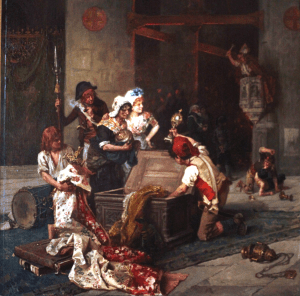 Though a classic in its own right, and arguably the first book on conservatism in the modern world, Edmund Burke’s Reflections on the Revolution in France of 1790 is inconsistent as a coherent work. And, yet, even in its unevenness, it reveals an act of genius. Burke himself points out that the greatest and truest things in life are discovered through trial and error, over time, following the way they already exist in creation.
Though a classic in its own right, and arguably the first book on conservatism in the modern world, Edmund Burke’s Reflections on the Revolution in France of 1790 is inconsistent as a coherent work. And, yet, even in its unevenness, it reveals an act of genius. Burke himself points out that the greatest and truest things in life are discovered through trial and error, over time, following the way they already exist in creation.
We can see that the construction of this book follows this path of discovery. In other words, all truth that ever will or ever can exist already does exist. Such truth is for man to discover, uncover, understand, and contemplate, not to create, manipulate, and abuse. Burke approaches the subject of the French Revolution in this manner. He reveals that the French are doing nothing new: their experiments repeat the mistakes of the many others who counter the lessons of history, and of those who counter the very nature and purpose of man. Continue reading
USA: from Republic to Democracy
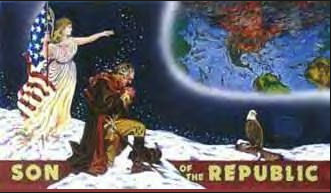 In 1750, the population of the thirteen colonies of England in North America was 2,148,000.
In 1750, the population of the thirteen colonies of England in North America was 2,148,000.
By the 1670’s, collection of taxes owed to the British Crown by settlers in North America had become problematic, as registered in his “Diary” by John Evelyn.
By 1775, the collection of taxes to be paid by the Americans involved resistance by gunfire on their part. Continue reading
Edwin Cole (April 19, 1951)
~ Prologue ~
April 11, 1951; President Harry S. Truman relieves General Douglas MacArthur of his command, ostensibly for ‘insubordination.’ Eight days later, General MacArthur has just concluded his nationally televised Farewell Address to Congress – a speech that was profound in its meaning as well as its nostalgia. The following was carefully written and crafted within minutes of the conclusion of the broadcast. Continue reading
General Douglas MacArthur ~ Farewell Address to Congress (April 19, 1951)
General of the Army Douglas MacArthur
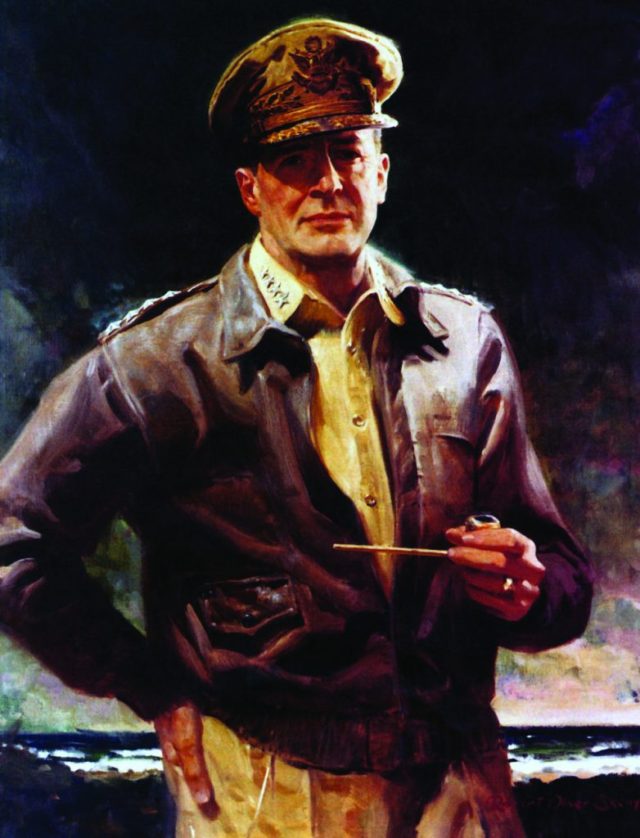 Douglas MacArthur was born in Little Rock, Arkansas, on 26 January 1880. He graduated first in his class from the United States Military Academy in 1903. Commissioned a second lieutenant, he served in the Philippines for a year. He was promoted to first lieutenant in 1904. From 1904 to 1906, he was an aide to the commander of the Pacific Division, his father Lieutenant General Arthur MacArthur. He next served as an aide to President Theodore Roosevelt and taught at the Army Services School at Fort Leavenworth, from 1908 to 1912. In 1911, he was made a captain and served on the General Staff from 1913 to 1917. In 1915, he was promoted to major and took part in the Vera Cruz operation.
Douglas MacArthur was born in Little Rock, Arkansas, on 26 January 1880. He graduated first in his class from the United States Military Academy in 1903. Commissioned a second lieutenant, he served in the Philippines for a year. He was promoted to first lieutenant in 1904. From 1904 to 1906, he was an aide to the commander of the Pacific Division, his father Lieutenant General Arthur MacArthur. He next served as an aide to President Theodore Roosevelt and taught at the Army Services School at Fort Leavenworth, from 1908 to 1912. In 1911, he was made a captain and served on the General Staff from 1913 to 1917. In 1915, he was promoted to major and took part in the Vera Cruz operation.
In 1917, he was promoted to colonel and made the chief of staff of the 42d (Rainbow) Division in France. Promoted to brigadier general in the National Army 1918, he fought in the Marne operations, commanded the 84th Infantry Brigade in the St. Mihiel and Meuse-Argonne offensives, and led the 42d Division in the Sedan offensives. Continue reading
The “Civil Rights” Races ~ March 3, 1865
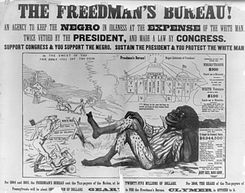 Claude Bowers in his notable book The Tragic Era that I have mentioned in some of these articles made note of the Union League Clubs.
Claude Bowers in his notable book The Tragic Era that I have mentioned in some of these articles made note of the Union League Clubs.
John Chodes, author of Segregation–Federal Policy or Racism? (Shotwell Publishing, Columbia, South Carolina,) noted the Union League on page 26 of that book. He said: “The Union League began as a political club in New York in 1863 to revive the sagging patriotic spirit of the Northern states during the War for Southern Independence. It’s philosophies were similar to the Radical Republicans so it fused with and became part of Republican vote-building machine for blacks in the post-war South…The Union League’s expenses were covered by the sale of confiscated white Southerners’ property, thus inciting the volunteers to harass the people in time of peace by unlawful seizure to provide the means of paying themselves. This further alienated whites from blacks.” In other words, the Union Leagues were “legal” Yankee/Marxist thieves.” Continue reading
Honor…
A person asked why admire an army that never won a war?
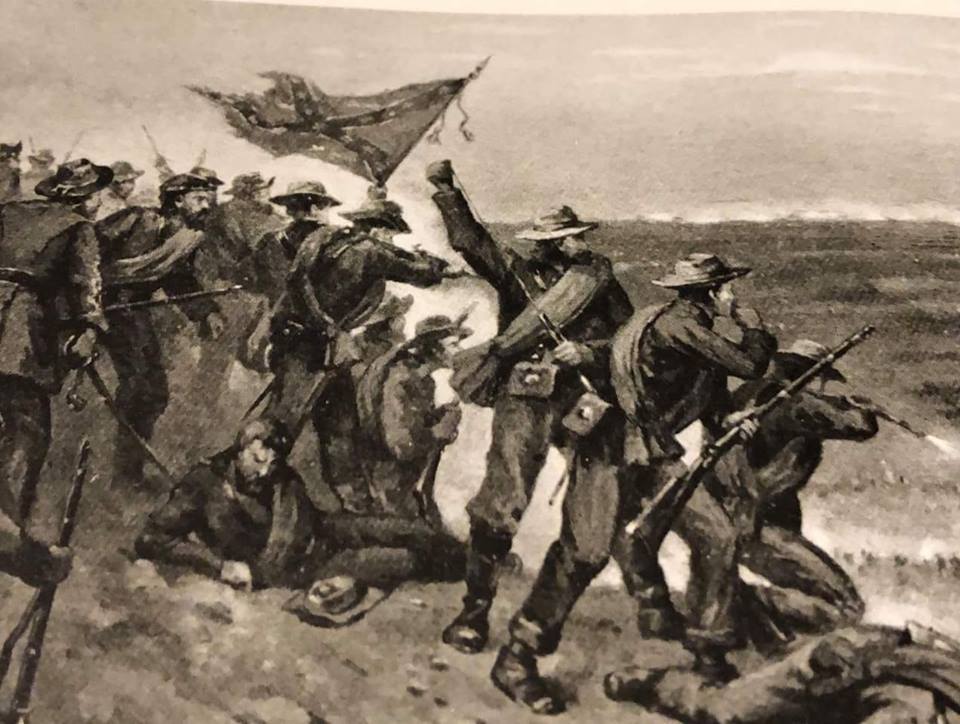 It was an army that emerged out of thin air. Underfed, underpaid, poorly shod, clothes in tatters, fought 4 years and bled their enemy dry while defending their homes, churches, schools, farms, families and communities from an invading force that outnumbered them in men and material. Continue reading
It was an army that emerged out of thin air. Underfed, underpaid, poorly shod, clothes in tatters, fought 4 years and bled their enemy dry while defending their homes, churches, schools, farms, families and communities from an invading force that outnumbered them in men and material. Continue reading
Ross: I Choose Knowledge Over Indoctrination
 I know I’ve spoken of this before, but the human brain is an amazing organ. It consists of a mix of water and fatty tissue. Yet within that gelatinous mass there are over 100 billion neurons that gather and transmit signals. Within each human brain is the recollection of every event that shaped that person’s life; both knowledge and personal experiences.
I know I’ve spoken of this before, but the human brain is an amazing organ. It consists of a mix of water and fatty tissue. Yet within that gelatinous mass there are over 100 billion neurons that gather and transmit signals. Within each human brain is the recollection of every event that shaped that person’s life; both knowledge and personal experiences.
When a person is born their brain is basically empty, aside from the basic operating system which performs the functions of breathing, eating, sleeping, and ridding the body of waste; as well as the stored memories from the time spent in the womb. It is what we learn in life; either through the educational process or by personal experiences that shape us into the people we grow up to be as adults. Continue reading
“Bury me with my people” ~ The Cruelty of War
 We saw a grave today at Cave Hill Cemetery that intrigued us….it is the grave of a woman buried with the Confederate Soldiers. The Epitaph simply reads…. “Bury me with my people.” ~ David Huff and Jenny Lee Huff, November 9, 2018
We saw a grave today at Cave Hill Cemetery that intrigued us….it is the grave of a woman buried with the Confederate Soldiers. The Epitaph simply reads…. “Bury me with my people.” ~ David Huff and Jenny Lee Huff, November 9, 2018
The story of Elizabeth Temms
The former Confederate soldier asked only one thing as death grew closer in a Federal prison in Louisville, Kentucky two years after the War had ended. The simple request, “bury me with my people” was apparently ignored by those in charge of the remains, who surely knew where “home” was. Continue reading
My America, 1620

Mayflower in Plymouth Harbor by William Halsall
In 1620, an extraordinary thing happened.
At a small landing on the extreme western edge of the Atlantic Ocean, a boat named “Mayflower” rested just off shore of a rock, soon to be named Plymouth. Lost, but not mortally or dreadfully so, roughly 100 “sojourners” and 30 “strangers” arrived on November 11. With Autumn full blown and winter approaching quickly, the 130 had to figure out how to live with one another, how to survive a New England winter, and, most importantly, how to create a permanent community. Continue reading
Jefferson Davis’ Proclamation of Thanksgiving ~ 1861
 WHEREAS, it hath pleased Almighty God, the Sovereign Disposer of events, to protect and defend us hitherto in our conflicts with our enemies as to be unto them a shield.
WHEREAS, it hath pleased Almighty God, the Sovereign Disposer of events, to protect and defend us hitherto in our conflicts with our enemies as to be unto them a shield.
And whereas, with grateful thanks we recognize His hand and acknowledge that not unto us, but unto Him, belongeth the victory, and in humble dependence upon His almighty strength, and trusting in the justness of our purpose, we appeal to Him that He may set at naught the efforts of our enemies, and humble them to confusion and shame. Continue reading
The Stars, the Bars and the Southern Cross
The Stainless Banner and hundreds of flags hand-sewn by women to represent their local Civil War battalions: Fascinating history of the many Confederate flags that came before the Southern Cross
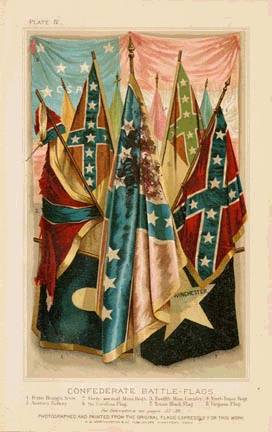 Capturing a Confederate battle flag during the Civil War was considered an act of valor with Union soldiers being granted furloughs and awarded Medals of Honor. To qualify, Union soldiers sent the captured flags to the War Department and later on to officials in Washington, D.C. where they were kept in storage until Congress passed an act in 1905 – decades after the war ended – to have them returned to the states of the units that carried them.
Capturing a Confederate battle flag during the Civil War was considered an act of valor with Union soldiers being granted furloughs and awarded Medals of Honor. To qualify, Union soldiers sent the captured flags to the War Department and later on to officials in Washington, D.C. where they were kept in storage until Congress passed an act in 1905 – decades after the war ended – to have them returned to the states of the units that carried them.
So many different variations of Confederate battle flags were created before the Southern Cross became widely accepted as the symbol in 1862, that 279 of them went unidentified and were sent to what was then the Confederate Museum in Richmond, Virginia. Today, it’s known as The American Civil War Museum and has more than 820 variations of Confederate and Union national, state, presentation, company and regimental battle flags, making it the largest collection in the United States. Continue reading
